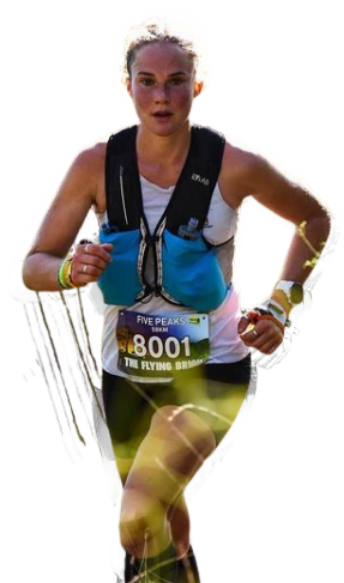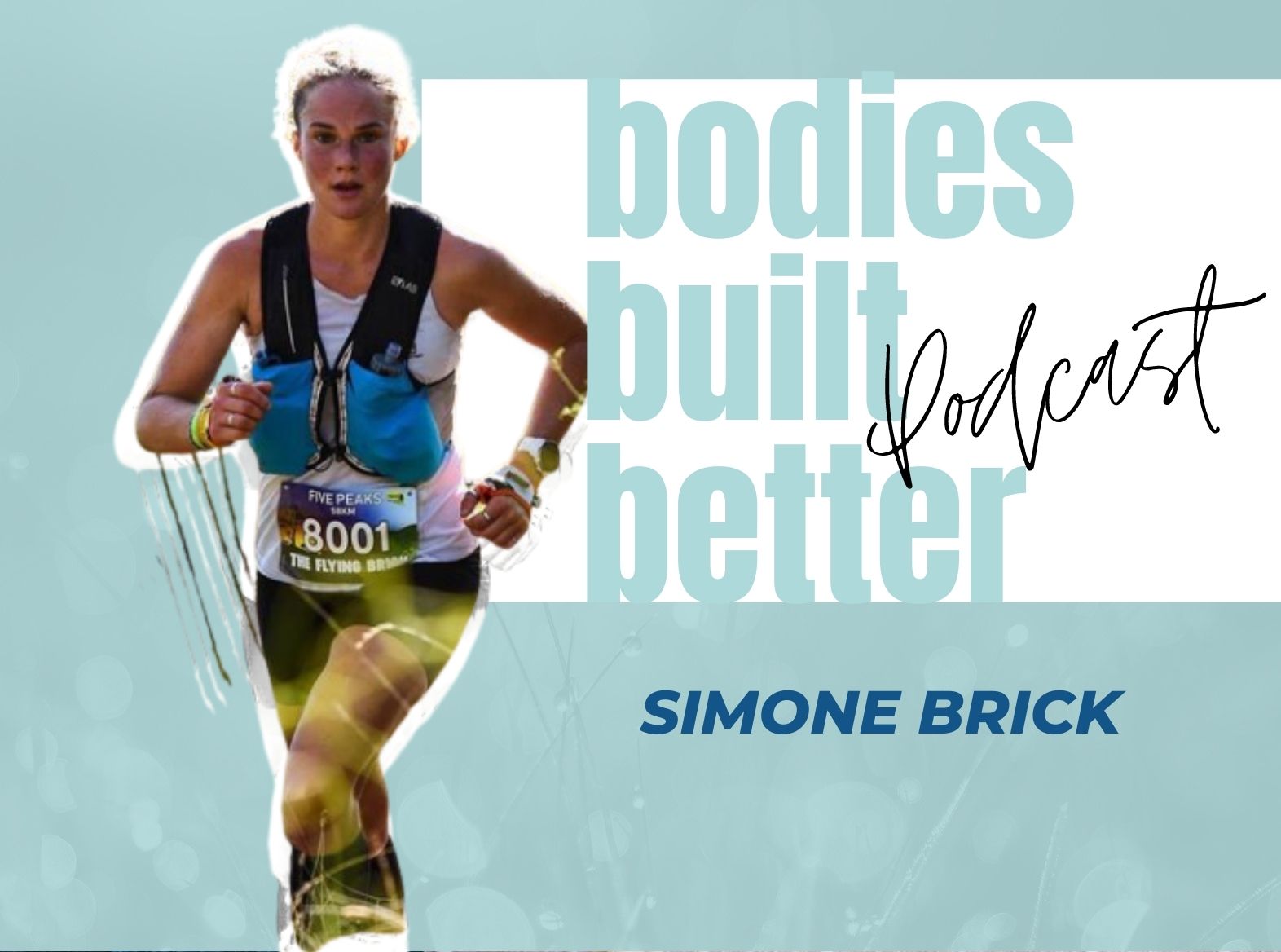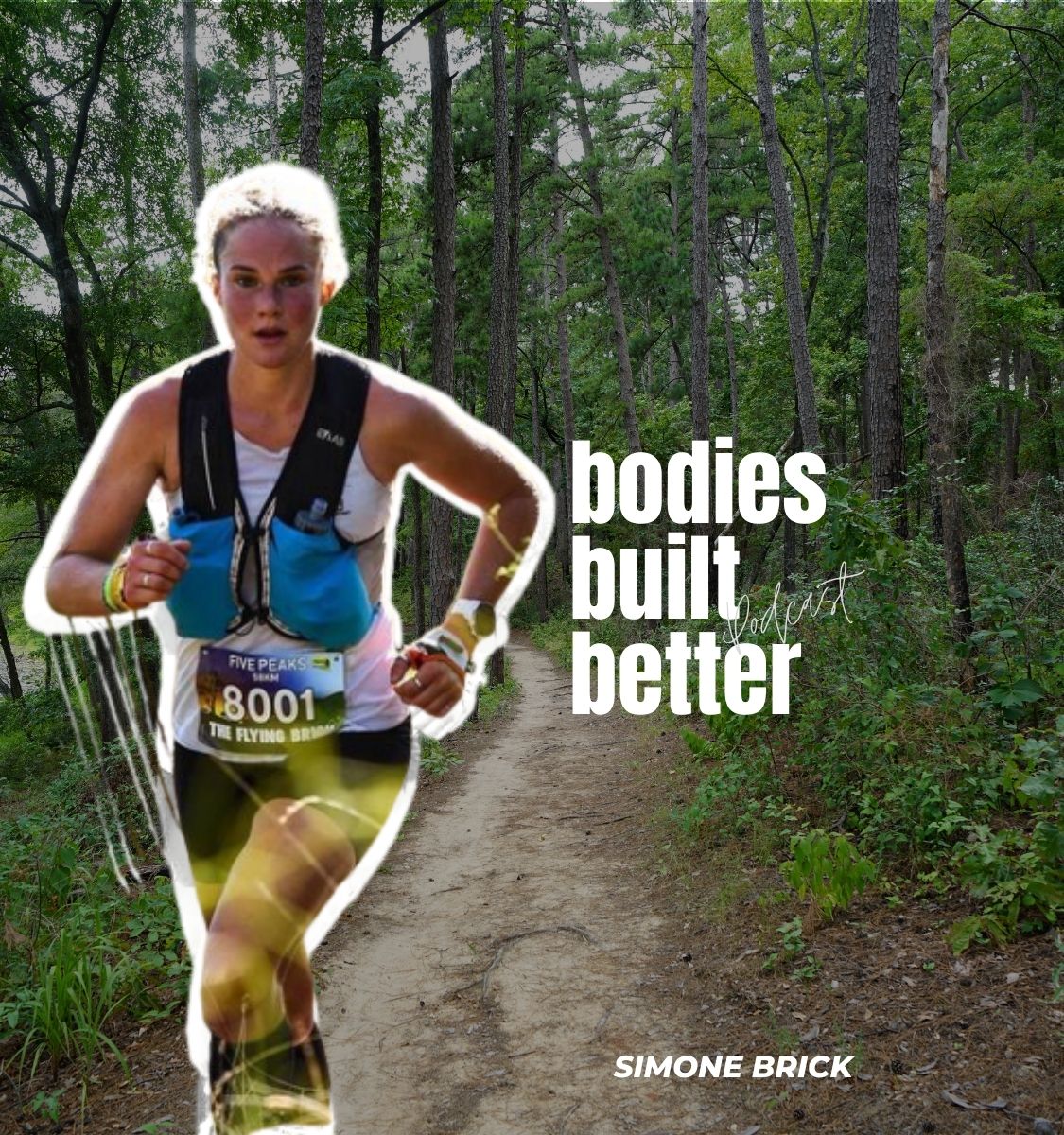Jackie 0:11
Hey, this is Jackie Tann and welcome to the body’s built better podcast. On the show we chat with experts, athletes, coaches and authors to educate and inspire you. We explore the body’s incredible ability to heal, adapt, and evolve so you could crush limitations, reconnect your body and mind and discover your extraordinary potential.
Jackie 0:44
Today on the show, I chat with Australian mountain running champion, personal trainer and running coach and mental health advocate Simone brick, only having been on the running scene a short while in running turns, she’s accumulated accolades most of us would only dream of she ran a first marathon in 2015 and cracked sub three and a half hours. She’s Australian mountain running champ 2018 and 2019. She came first at the New Zealand mountain running championships 2019 second, in the ultra trail Australia 2019. But what you may not know is that Simone has battled with depression, anxiety, eating disorders, psychosis, all of which has seen her move through hospitals and treatment centres, and had at one stage been written off as too far gone. Simone’s incredible strength and determination to back herself and come through the other side is truly inspiring. This bright and spirited runner will help you see that your darkest hours will only give way to the brightest days if you fight for him. I’m truly grateful to Simone, her willingness to share her experience and to help others is inspiring, admirable, and vitally important to help others dealing with very dark days. So whilst this conversation is incredibly inspiring, I do want to let you guys know that the conversation does get dark. And if you’re not in a place that can hear and not be triggered, then maybe wait till you’re in a better position to hear this episode. This episode is in two parts and incredibly worth the listen. This first part here we talk about Simone’s early days and her battles. In the second part we do talk about how she incredibly got through it all. How running has been a big part of her life is her successes through running, but also how she manages her mental health through different strategies. And whilst running plays a big part in that is not one strategy that gets her through. So she doesn’t rely solely on running, which is a really important message to convey as well. So enjoy this inspiring conversation with the extraordinary Simone brick. Simone, thank you so much for joining me today. I’m pretty excited to chat with you. Because originally when I thought about having you on the show it was because of all your incredible running achievements. Just to name a few you came first in the New Zealand mountain running championships in 2019, the two bays trailer on 28k 2019 and 2020. And a second in the ultra trail Australia pays 22 in 2018. And then I read about you and found out you’ve had some pretty heavy mental health battles. And you just became even more incredible to me. So to give listeners a bit of background on you and how you became this incredible woman, let’s start from the beginning. You growing up and what that was like for you.
Simone 4:34
Yeah, show. Thanks for having me on Jackie. And yeah, like, I suppose in many ways, I’m just a normal human, but just with a lot of life experience, I suppose. Not being as old as I sometimes feel. But yeah, so growing up, I was one. I’m the second youngest of seven kids, which I feel like explains a lot of my story just on its own right there. Because Yeah, competition and sports and everything that comes along with being a big part of a big family was just my life growing up. And yeah, I can’t say that it was the happiest childhood or the most carefree, but at the same time it was, it was I was loved I was sheltered I was cared for I was I had a lot of things going for me and a lot of different privileges that I can definitely see now. But yeah, I was the sportiest kid, you knew I was a tomboy and a half. Because I grew up I’ve got the four siblings closest in age to me are all brothers. So I’ve just pretty much just tried to become one of the boys. And I did every sport under the sun, except running. I hated running with a passion. As one of those kids that yet running was the punishment for not getting the ball in the hoop or the ball in the back of the net. Yeah, soccer and basketball will probably be my two biggest loves swimming for a while. But yeah, sport was always my sort of solace was always where I went to sort of feel like everything was right with the world. And yeah, that sort of continued, right up until teenage years. But I suppose the other part of that context is that I was always very, very big in comparison to other people growing up, which I now know, after finally being diagnosed years after the fact is, I had PCs, so polycystic ovary syndrome, and so I was like, I was an 80 kilo 12 year old and didn’t know why or what was going on, or why my body was reacting differently to foods that everyone else was I was also lactose intolerant and undiagnosed celiac, and all sorts of things that just were very confusing at the time, because I didn’t know that any of them were even there, or why all I knew was, other people would eat food, I would eat the same thing. And different things would happen to my body compared to theirs. So that was probably a big struggle. Throughout my teenage years that just you don’t, no one needs extra struggles as a teenager is hard enough. But yeah, so high school, to be honest, I hated it. I love parts of it, but I hated it. And then I was, I suppose, given up a lot of sport, at the tip adult, the typical age that a lot of women do hence why I’m now pretty passionate about trying to keep girls in sport, because yeah, from about 15 to 1920, I didn’t do much. I kept up a little bit here and there, but didn’t stay too engaged other than my lovely soccer family that I had going. But as a result of that, and you 12 and all that I got very, very, very overweight to the point that my asthma was being hospitalised for asthma and all sorts of stuff going on, and my doctor was telling me to lose weight. And lo and behold, like having had, I suppose trauma from my childhood, and then also lots of struggles with food throughout my teenage years that were nothing to do with like I ate normally despite them in many ways, but there was still very confusing so it kind of all manifested in a gap year where I decided I was going to get my life in order and make everything perfect and went the wrong way. A very much so about losing weight. And tell you what there’s a lesson and a half in that about the value of nutrition because once my brain didn’t have enough nutrition, and that had that like that just inability to cope with life or to function or to be like I went from someone who was close to ducks to the class and like very high ATAR very smart like I was actually Brainiac on side of being a sporty person, but then to not being able to do anything like my brain just did not function I like it’s just insane to think the thoughts that I had at that point in time. And I can see now that it’s purely because my brain didn’t have what it needed to actually function properly. But it’s scary, and it’s creepy. And it’s like it took forever to come back from in so many ways. But
Jackie 9:02
So get an idea what we would do. Did you like to stop eating altogether, like very minimally? Or was it really bad food?
Simone 9:12
I had no so I yeah, I’m not a person that does anything by halves. And so pretty much from the day, which in many ways I hate talking about weights, but at the same time, it gives people an idea of where I was going from and to. So from the day I started deciding that it was time to get my shit together and lose a bit of weight because the doctor told me I’d and I’d had another bad asthma attack and I could hardly get up the stairs and just was not fit at all. From that day to the next I think it took me eight months to lose about 50 kilos. And so I’ve pretty much from that day forward. I haven’t eaten three meals in a day for almost a year. But I also would go like, this is just no one I’m moving. No one listens to this that would ever try this or he’s in a bad way in that way. But I’ll have him give you different advice on that later. But I would go sort of seven days with only having 500 mils of water a day. And that was it. And I got to the point of view, I was fainting, I was all over the place. But I was, in my mind, the worse I felt, the better I was doing or the thought like it to me, it was all a mathematical equation, like it was also it was like, the less I ate, the more weight I lose, I need to lose weight, therefore, I’ll eat less. I just took that to the next extreme, because I wanted to do it fast, because it seemed like the least painful way to do it. Not having any idea about the effects of malnutrition on the brain and the body.
Jackie 10:46
But you just see the numbers right? You see them?
Simone 10:48
Exactly. And they know that they’re doing it. Well. The hard thing isn’t the society we live it’s like I was getting applauded for the first exactly
Simone 10:56
what four or five months until people realise Hang on a second. These diets are going a little bit too well. Yeah, like it took until I lost the first 30 kilos for people to go Whoa, hang on a second, how much more is coming off. And, and to realise this is really quick. Yeah, exactly. To realise I’ve done that in a very short period of time. And that I’d gotten my first full time job. And that was not a good job to have. I was not helping myself in many ways. But then I was stuck in very bad environments, and in many different areas of life as well. And because I deferred study, I didn’t have study to distract me or anything, either. And so I took it, in many ways, all out on myself for a while, because it just seemed like I was the one doing everything to destroy my own life. It wasn’t in swap outs, what six months, eight, seven months after I sort of started losing the weight, I had my like, I attempted suicide for the first time. And that obviously got a bit more attention from the medical teams. But at the same time, it very much taught me that the system in a lot of ways, and I feel for anyone still in it, although I have been told it is, in some ways, improving at times is a bit broken. I was essentially in an ice ACU so I kept the cardiac unit and ICU for a few days. And then just sent straight home because there were no beds. Well, I was told that my weight didn’t wasn’t yet low enough for me to qualify for a bed for help for my eating disorder,
Follow Simone:
Website: www.stillwerise.com.au
Instagram: @theflyingbrick_
Get Help:
Butterfly – Support for eating disorders and body issues
Beyond Blue – Support for anxiety and depression
Get In touch with Me:
Instagram: @jackietann_rmt
Email: jackie@jackietann.com













